Google Search
Thank You Mr. Charles Hunter: Common Sense Practitioner, St. George's 1859
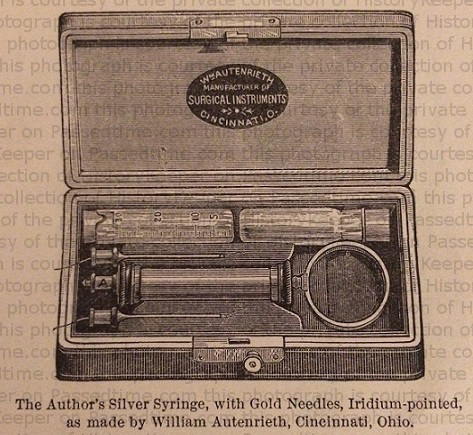 It is funny how often a written piece often takes a thoroughly unexpected direction, which is what happened with this article. Originally, I was going to present a brief medical history of hypodermics with pictures of early syringes. Yet, as I read through the first couple of pages of Hypodermatic Medication*, I realized Mr. Charles Hunter (active 1859, St. Georges Hospital, London) deserves a big "thank you" for his common sense approach to medicine.
It is funny how often a written piece often takes a thoroughly unexpected direction, which is what happened with this article. Originally, I was going to present a brief medical history of hypodermics with pictures of early syringes. Yet, as I read through the first couple of pages of Hypodermatic Medication*, I realized Mr. Charles Hunter (active 1859, St. Georges Hospital, London) deserves a big "thank you" for his common sense approach to medicine.
The first item that jumped out at me (not the first to appear chonologically in the book, but the first part of the book I read) was Hunter's ability to overlook minutia. Possibly recognizing that his patients cared not one whit what an injection was called as they were being jabbed, Hunter did not get bogged down in terminology. It was he who suggested using the term "hypodermic" as opposed to the ostensibly correct "hypodermatic." Hypodermic had already been in use, why fight it? Note the author of Hypodermatic Medication, Roberts Bartholow, was going to attempt to steer his readers into using the correct terminology after releasing other editions of his own book which used the term "hypodermic." 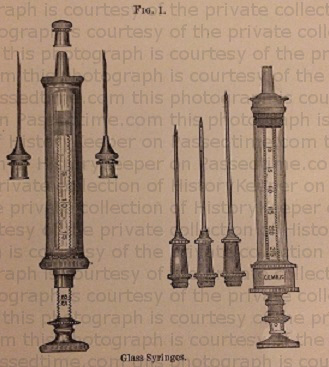
"...Mr. Hunter in 1859, proposed the word hypodermic as the name of the new method, in imitation of terms already in use, as epidermic, etc. The word hypodermic is compounded of two Greek words,ὑπό , under, and δέρμα, the skin. This word is condemned by all scholars, who are unanimous that the term should be--in accordance with the rules of construction--hypodermatic. That eminent philologist and Oriental scholar, Mr. Fitzedward Hall, D.C.L. assures me that under no circumstances is hypodermic allowable. It is, however, so firmly established, and in such universal use, that the substitution of the more correct term can be accomplished only by combined effort.
In the earlier editions of this work I have followed the general custom in using hypodermic, but in the former and present edition, and in the later editions of my "Practical Treatise of Materia Medica and Therapeutics," I have departed from the common usage to do my part towards the introduction of the more correct term, hypodermatic. ...."*
More importantly, Mr. Charles Hunter suggested physicians need not inflict pain in order for injections to succeed. In "Experiments Relative to the Hypodermic Treatment of Disease," his substantial research revised the thinking around the way injections should administered. This was in direct contrast to the beliefs of Alexander Wood (1817-1884) who is credited with creating the first "hypodermatic" syringe.
"Although Wood directed that 'the instrument is not to be put into the place where the patient complains of pain, but into the spot where you find you can awaken pain on pressure...' It was reserved for Mr. Charles Hunter to demonstrate the important fact that the application of the injection to the painful points, as contended for by Wood, was really unnecessary, and that equally good effects followed the introduction of the injection into a distant part."**
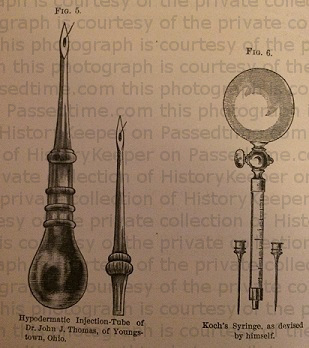 Evidently the two physicians, Wood and Hunter, spent ample time arguing over the best placement of injections.
Evidently the two physicians, Wood and Hunter, spent ample time arguing over the best placement of injections.
As an interesting aside, a good number of Alexander Wood's patients became morphine addicts. Some claim his wife, Rebecca (Massey) Wood, is the first recorded instance of death via hypodermic syringe--she overdosed on morphine. However, others discredit the story and suggest she outlived her husband.***
For those of us who deplore being jabbed, the most important contribution Charles Hunter should be credited with is one common sense alteration he made upon syringes. This one small improvement that would make all the difference in the world.
"The instrument used by Wood in his first experiments was a Fergusson syringe, intended for the injection of liquor ferri chloridi into naevi. This instrument, like the Anel and the Pravaz syringe (French), required a preliminary opening to be made in the skin, through which the canula could be passed. Mr. Hunter made a most necessary and important improvement when he had a cutting point put on the canula for transfixing the skin."****
Undoubtedly, the world owes Alexander Wood a great debt. Yet, without Charles Hunter's common-sense approach to medicine, hypodermic injections of today might be even more fearsome. In Their Own Words. Pat Earnest 26 August 2015 Dover, DE 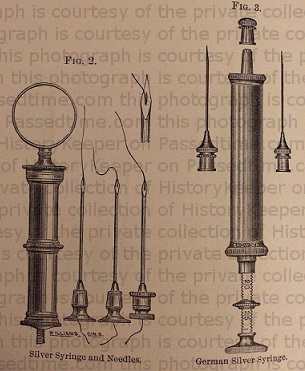
*A Manual of Hypodermatic Medication: The Treatment of Diseases by the Hypodermatic or Subcutaneous Method. By Roberts Bartholow, A.M, M.D., LL.D. 5th Edition, J.B. Lippincott Company 1891. p 27
**Ibid, p. 23
***Opium: A History. Martin Booth. St. Martin's Griffin, 2013 p. 72
Soapbox interjection: this argument is exactly why primary source material is so incredibly important
****A Manual of Hypodermatic Medication, p. 23
As Always, more information is always appreciated.
Author Pat Earnest, currently lives in Dover, Delaware, with family, both two- and four-footed. I am a published author and history enthusiast, who has great regard for the past and is especially proud of the Pennsylvania German culture. In addition to Passed Time, I am currently working on a project for the German Historical Institutes Immigrant Entrepreneurship: German-American Business Biographies (http://www.ghi-dc.org). I also contribute to various newsletters and I am working on another book...or two. Feel free to email me at pcsuter@hotmail.com with questions, comments, information, a shared love of history, an idea, because you want to chat or you have an great idea for PT. Please be aware, Files With Attachments will not be opened, but immediately deleted.

Comments (16)
-
Guest - John
PermalinkAwesome and interesting article. Great things you've always shared with us. Thanks. Just continue composing this kind of post. Movies flix
0 Like -
Guest - John
PermalinkI will really appreciate the writer's choice for choosing this excellent article appropriate to my matter.Here is deep description about the article matter which helped me more. Locksmith service in Bet Shemesh
0 Like -
Guest - John
PermalinkThanks for taking the time to discuss this, I feel strongly about it and love learning more on this topic. If possible, as you gain expertise, would you mind updating your blog with extra information? It is extremely helpful for me. Buy Website Traffic
0 Like -
Guest - John
PermalinkThanks for sharing this information. I really like your blog post very much. You have really shared a informative and interesting blog post with people.. refurbished servers dell
0 Like













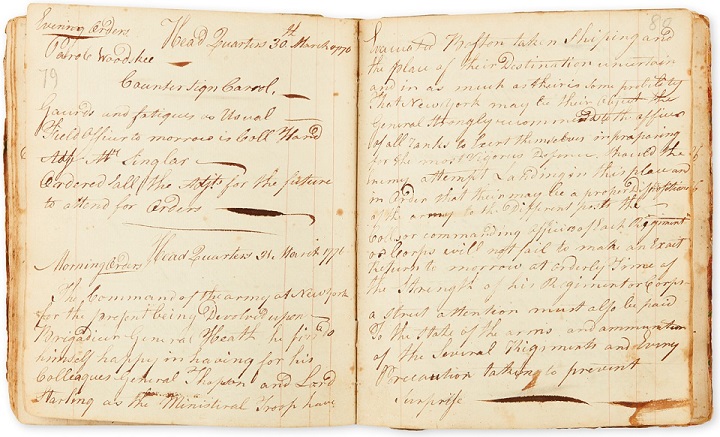










Leave your comments
Login to post a comment
Post comment as a guest